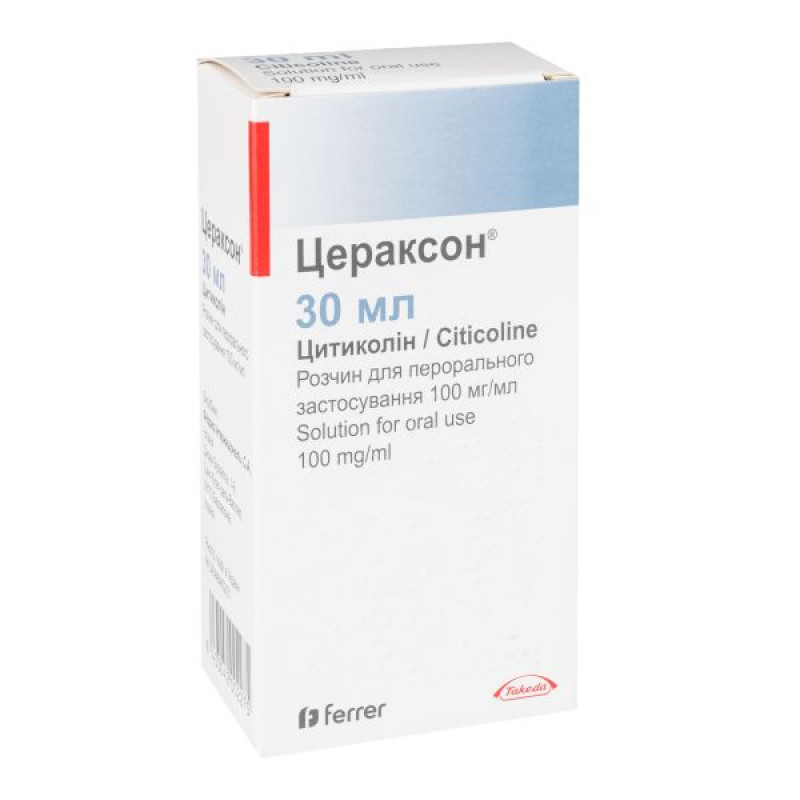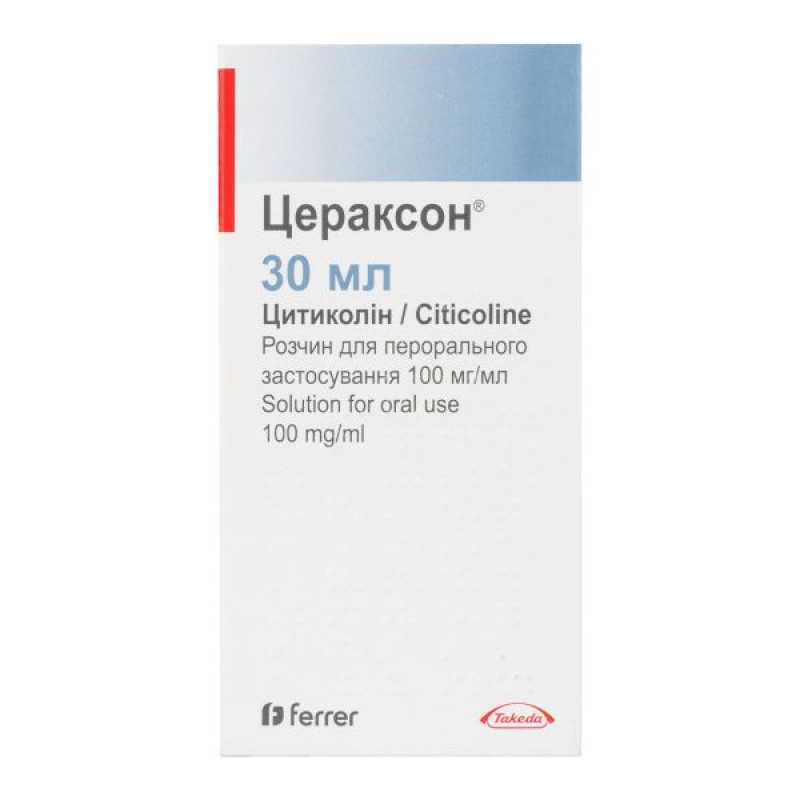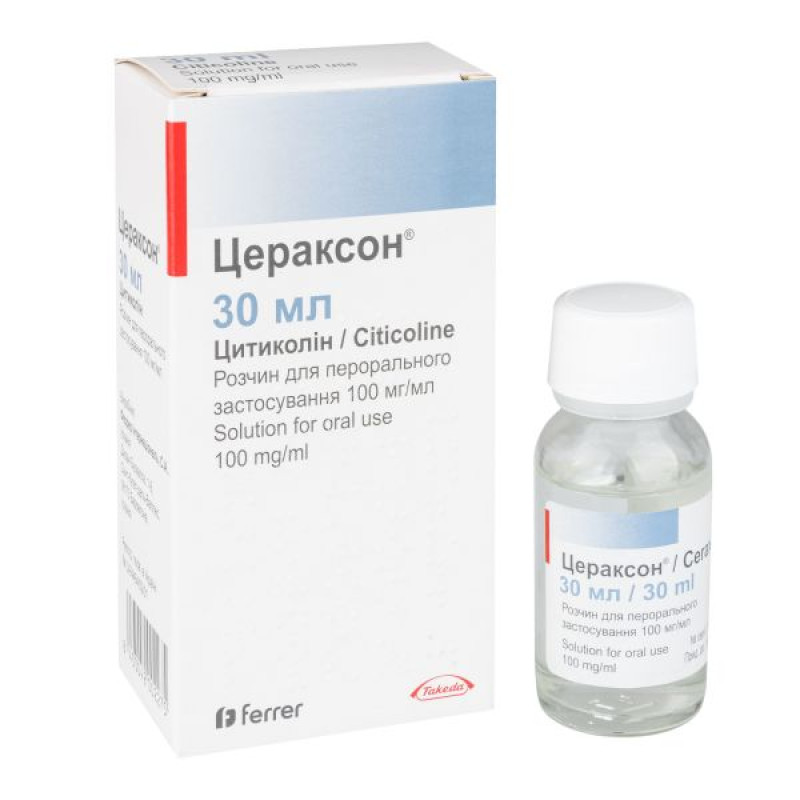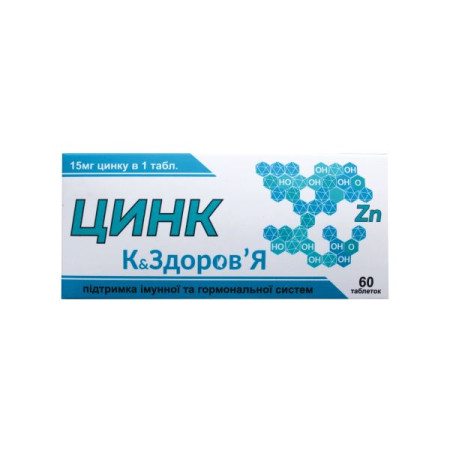Ceraxon oral solution 100 mg/ml bottle 30 ml

Instructions Ceraxon oral solution 100 mg/ml bottle 30 ml
Composition
active ingredient: citicoline;
1 ml of solution contains 104.5 mg of citicoline sodium, which corresponds to 100 mg of citicoline;
excipients: sorbitol 70% (E 420), glycerin, methyl parahydroxybenzoate (E 218), propyl parahydroxybenzoate (E 216), sodium citrate, sodium saccharin, strawberry flavoring, potassium sorbate, anhydrous citric acid (50% solution) to adjust pH to 6.0, purified water.
Dosage form
Solution for oral use.
Main physicochemical properties: colorless transparent liquid.
Pharmacotherapeutic group
Psychostimulants, drugs used for attention deficit hyperactivity disorder (ADHD), nootropics. Other psychostimulants and nootropics.
ATX code N06B X06.
Pharmacological properties
Pharmacodynamics.
Citicoline stimulates the biosynthesis of structural phospholipids of neuronal membranes, which is confirmed by magnetic resonance spectroscopy. Due to this mechanism of action, citicoline improves the functioning of such membrane mechanisms as the work of ion exchange pumps and receptors, the modulation of which is necessary for the normal conduction of nerve impulses.
Due to its stabilizing effect on the neuronal membrane, citicoline exhibits anti-edema properties that help reduce brain edema.
Experimental studies have shown that citicoline inhibits the activation of some phospholipases (A1, A2, C, and D), reduces the formation of free radicals, prevents the destruction of membrane systems, and preserves antioxidant defense systems such as glutathione.
Citicoline preserves the energy reserves of neurons, inhibits apoptosis, and stimulates the synthesis of acetylcholine.
It has been experimentally proven that citicoline also exhibits a preventive neuroprotective effect in focal cerebral ischemia.
Clinical studies have shown that citicoline significantly increases functional recovery in patients with acute ischemic stroke, which coincides with a slowdown in the growth of ischemic brain damage volume according to neuroimaging data.
In patients with traumatic brain injury, citicoline accelerates recovery and reduces the duration and intensity of post-traumatic syndrome.
Citicoline improves the level of attention and consciousness, cognitive and neurological disorders associated with cerebral ischemia, and helps reduce the manifestations of amnesia.
Pharmacokinetics.
Citicoline is almost completely absorbed after oral administration. After administration of the drug, a significant increase in plasma choline levels is observed.
The drug is metabolized in the intestines and liver to form choline and cytidine.
After administration, citicoline is widely distributed in brain structures with rapid incorporation of the choline fraction into structural phospholipids and the cytidine fraction into cytidine nucleotides and nucleic acids. In the brain, citicoline is incorporated into cellular, cytoplasmic and mitochondrial membranes, integrating into the structure of the phospholipid fraction.
Only a small amount of the dose is found in the urine and feces (less than 3%). Approximately 12% of the dose is excreted through exhaled CO2. During the excretion of the drug with urine, two phases are distinguished: the first phase - within 36 hours, in which the rate of excretion decreases rapidly, and the second phase - in which the rate of excretion decreases much more slowly. The same phasic nature is observed in excretion through the respiratory tract. The rate of CO2 excretion decreases rapidly, for about 15 hours, then decreases much more slowly.
Indication
- Stroke, acute phase of cerebrovascular disorders and treatment of complications and consequences of cerebrovascular disorders.
- Traumatic brain injury and its neurological consequences.
- Cognitive and behavioral disorders due to chronic vascular and degenerative cerebral disorders.
Contraindication
- Hypersensitivity to citicoline or to other components of the drug.
- Increased tone of the parasympathetic nervous system.
Interaction with other medicinal products and other types of interactions
Citicoline enhances the effect of levodopa. The drug should not be prescribed simultaneously with drugs containing meclofenoxate.
Application features
Patients with hereditary fructose intolerance should not take Ceraxon, oral solution, as the preparation contains sorbitol. Methyl parahydroxybenzoate and propyl parahydroxybenzoate, which are contained in the preparation, may cause allergic reactions (usually delayed).
Use during pregnancy or breastfeeding
There are no adequate data on the use of citicoline in pregnant women. Data on the excretion of citicoline into breast milk and its effect on the fetus are unknown. During pregnancy or breastfeeding, the drug can be prescribed only if the expected therapeutic benefit to the mother outweighs the potential risk to the fetus.
Ability to influence reaction speed when driving vehicles or other mechanisms
In individual cases, some adverse reactions from the central nervous system may affect the ability to drive or operate complex machinery.
Method of administration and doses
For oral use. The recommended dose of Ceraxon, oral solution in vials, for adults is from 500 mg (5 ml) to 2000 mg (20 ml) per day, which should be divided into 2-3 doses, depending on the severity of the symptoms.
The drug should be taken using a dosing syringe according to the following scheme:
- Before use, the plunger of the dosing syringe should be fully depressed.
- Pull back the plunger and draw the required dose, taking into account that the amount of liquid in the syringe must correspond to the prescribed dose.
- Take the drug directly or dilute it in half a glass of water (120 ml), regardless of meals.
It is necessary to rinse the dosing syringe with water after each use.
The recommended dose of Ceraxon, oral solution in sachets, is 1-2 sachets (10-20 ml) per day, depending on the severity of the disease. The drug should be taken directly from the sachet or diluted in half a glass of water (120 ml), regardless of meals.
The dosage of the drug and the duration of treatment depend on the severity of the brain lesions and are determined individually by the doctor.
Elderly patients do not require dose adjustment.
Children.
Experience with the use of the drug in children is limited.
Overdose
No cases of overdose have been reported.
Adverse reactions
Adverse reactions occur very rarely (<1/10,000), including isolated cases.
From the side of the central and peripheral nervous systems: severe headache, vertigo, hallucinations.
From the cardiovascular system: arterial hypertension, arterial hypotension, tachycardia.
Respiratory system: shortness of breath.
From the digestive tract: nausea, vomiting, diarrhea.
On the part of the immune system: allergic reactions, including: rash, hyperemia, exanthema, urticaria, purpura, itching, angioedema, anaphylactic shock.
General reactions: chills.
Expiration date
3 years.
Storage conditions
Store at a temperature not exceeding 25 °C.
Keep out of reach of children!
Do not freeze.
During storage, slight opalescence is possible, which disappears when the drug is kept at room temperature (≈ 20 °C).
Packaging
30 ml in a bottle; 1 bottle with a dosing syringe in a cardboard box.
10 ml in a sachet; 10 sachets (1x10; 2x5) in a cardboard box.
Vacation category
According to the recipe.
Producer
Ferrer Internacional, SA, Spain.
Location of the manufacturer and its business address
Joan Buscalla, 1-9, Sant Cugat del Valles, 08173 Barcelona, Spain/Joan Buscalla, 1-9, Sant Cugat del Valles, 08173 Barcelona, Spain.
There are no reviews for this product.
There are no reviews for this product, be the first to leave your review.
No questions about this product, be the first and ask your question.














